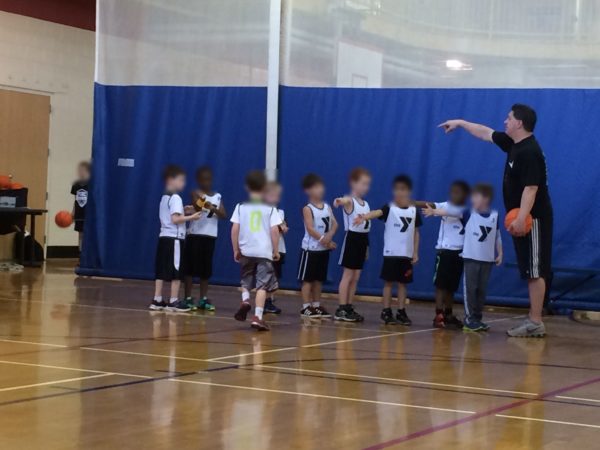(Today’s guest essayist, Tim Spiker, is the founder of The Aperio, an organization with a simple, yet powerful goal in mind – to help individuals and organizations lead better. Sometimes, it is the instances that cause us the biggest frustration that lead us to some pretty cool life lessons. Tim had one of those instances and he is here today to share it. Also, if you are interested in learning even more lessons – check out the three lessons I learned from from an experience with Comcast.)
My oldest son is 6 years old. This winter I’m coaching his first foray into the sport that has been a deep passion for me. Basketball. As you might guess, this team of little boys produces only a dim reflection of actual basketball. It’s a herd of 10 kids running up and down the court, barely dribbling, and failing to make more than a few baskets over the course of an entire game.
At the start of our second practice, before we’d played any games, the father of two kids on our team approached me. He didn’t approve of the way I’d taught the kids to shoot a basketball during our first practice. I explained why I was teaching the boys as I was. I couldn’t tell if he was satisfied with my answer or not. Nonetheless, I felt confident that I was doing right by the kids in teaching them proper technique.
Then came our first game. (Enter ominous music: Du, du, duuuuuuuuh!)
That Dad
From the beginning of the game until the end, the father who had confronted me yelled at his kids to shoot the ball every time they touched it. It was as if no other kids existed on our team. His instructions, which were easily audible for everyone in the gym to hear, never mentioned rebounding or passing the ball to a teammate. He simply boomed instructions to his sons to shoot and shoot and then shoot some more.
I was more than a little bit annoyed. I was trying to help the kids have fun while they got to know a little bit about the game. The latter includes learning what it means to be a good teammate (aka passing the ball at least once in a while). I could tell that, when it came to sharing the ball, I was going to have a problem with the dad, his sons, or both.
Oh, and by the way, his sons combined to score all three of our team’s baskets in our first game. #worstcasescenario
The Unexpected Emotion of Game #2
As we entered our second game, I was fully prepared for the crazy dad to do his thing again. To my surprise, he was more relaxed. Don’t get me wrong, he wasn’t insisting his sons share the ball with their teammates, but he was far less animated and vocal than during our first game. It no longer seemed like a matter of life and death for his sons to score.
Near the end of the game, my favorite player on the team — my son — scored the first basket of his young career. Oh how I wish I had a video of it. After the ball went through the net, he raced back down the court with one hand high in the air, a smile the size of a sideways banana, and a yell of utter joy that would cause any parent’s soul to soar. In that moment, I was caught off guard by my emotions. I was instantly elated that he was having so much fun. All I wanted to do was jump around with him and celebrate. I was so excited about his excitement that I had to consciously manage myself to stay focused on the whole of our team.
As I thought about that moment this week, I realized that maybe, just maybe, I had a leadership lesson to learn from the dad who annoyed me so.
Was it possible that he merely wanted his sons to have the thrill of having scored a basket? Could that be why he was far less vocal during the second game than during the first? How valuable is the joy of scoring a first basket in keeping the kids engaged in the process of learning basketball?
The Important Reminder
The situation reminded me that when we lead we must be careful to consider all factors–short-term, long-term, emotional, and practical. I’d been focused on the kids learning the basics of the game. That is critical if they are to have success and enjoy playing in the future. But it is the joy-filled moments that encourage the kids to want to stay engaged in what we are doing. Getting too focused on the long-term and practical needs of the team could actually derail what we are trying to do over the long haul.
It is easy to see that short-term delight can be created in a 6-year old’s basketball game by a kid scoring a basket. In the organizational life of an adult, however, it is far more difficult to know how to create such wins. Is it done by making a big deal about modest improvement simply because it is heading in the right direction? Is it done by giving public recognition for a small but important gesture? Is it done by privately giving someone an extra day off for having put in some extra effort? Whatever it is, we need find out what creates short-term delight for each individual we lead. Even though it is the fundamentals of operations, sales, customer service, innovation, process improvement, and the like that make our endeavors successful over time, our followers need moments of joy to fuel their efforts along the way.
Perhaps the dad who bellowed for his kids to shoot the ball was on to something. Maybe the coach was the one who had a leadership lesson to learn.
P.S. Here’s a picture of my kid sleeping with his basketball jersey on. Think he’s excited about being on the team?

(Tim, we are so grateful to you for sharing this with us. If you would like to read more of Tim’s stuff you can check out his blog here. If you’re interested in submitting a guest essay, we’d love to hear from you. We’re looking for stories about management, marketing, or motivation that would be helpful to people who own or work for family businesses or nonprofit organizations. Contact us with your submission today!)




Leave a Reply